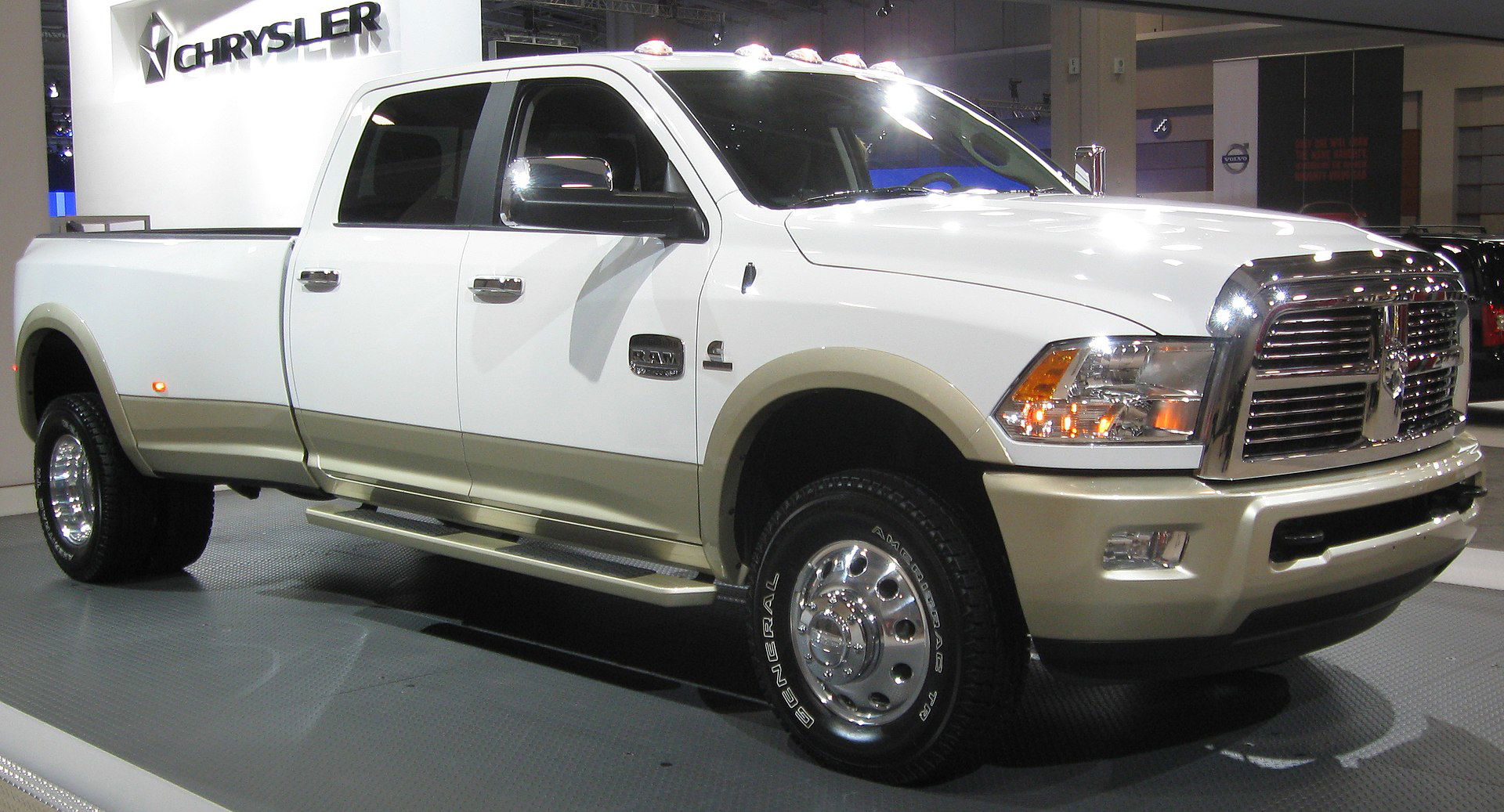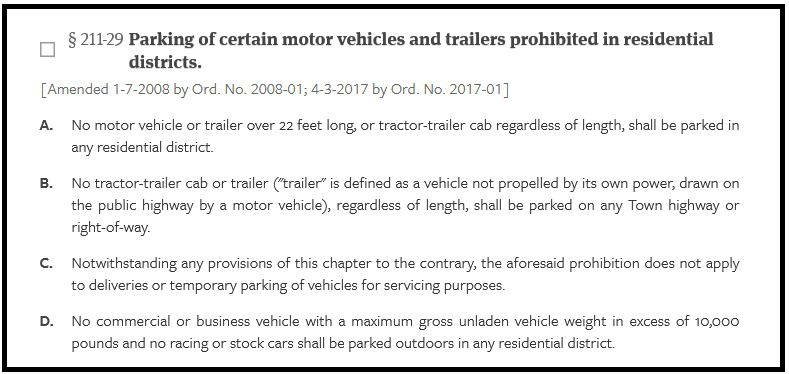Proposed Change to Town of Clay Truck Parking Law

About
At 7:30pm on Monday March 19, 2018, the Town of Clay will hold a public hearing for comment on a proposed slight change of wording to a residential parking ordinance. The specific change will be as follows:
Current Law:
“No commercial or business vehicle with a maximum gross unladen vehicle weight in excess of 10,000 pounds and no racing or stock cars shall be parked outdoors in any residential district.”
Proposed Law:
“No commercial or business vehicle with a gross vehicle weight rating and/or gross combined weight rating in excess of 10,000 pounds and no racing or stock cars shall be parked outdoors in any residential district.”
Sources: http://www.townofclay.org/board/notices
https://www.ecode360.com/7206955
The Concern
Until now, this ordinance only applied to very large vehicles with an Unladen weight over 10k pounds. The proposed change will make the parking ban applicable to much smaller vehicles which could potentially include pickup trucks. The town has not stated what definition they plan to use for a "Commercial or Business Vehicle" but by all common sense measures, it seems likely that an F-350 (typically 12,500 lb GVWR) with the name of a business on the side of it would would fit the definition of a "Business vehicle over 10,000 pounds GVWR" and therefore would be illegal to park in a residential driveway.
Whether or not the town is choosing to consider every vehicle that has been registered with the DMV as "Commercial" (almost every pickup truck) a commercial vehicle, they have not written into the code. They have verbally stated that is not the intent, but without having it in writing it's up to the interpretation of law enforcement and the court (who don't tend to use past verbal political statements as factors in thier interpretation of written law). The lack of definition is a concern.
The other issue is the ordering of the law. Subparagraph (C) states:
"Notwithstanding any provisions of this chapter to the contrary, the aforesaid prohibition does not apply to deliveries or temporary parking of vehicles for servicing purposes."
Since the proposed change applies to subparagraph (D), which comes after the exception for temporary parking of service vehicles, landscaping/lawn mowing trucks, delivery trucks, paving trucks, etc would likely not be exempt (a potentially unintended consequence of the wording).
My personal feelings as a resident: I feel we should either change the undefined term "Maximum Gross Unladen Vehicle Weight" (which I've been told was the cause of this proposed change) to the NYS DMV recognized term "Unladen Weight" or we should define exactly what a "Commercial or Business Vehicle" is in the code, so we know EXACTLY what it is we are banning...before we ban them...
Action
Please consider attending the Town Hall public hearing at 7:30 on March 19, 2018 to object to the proposed change to the ordinance or send the Town Council an email/letter. The contact information, to include the email address, for the town council is on the official Town of Clay website. I've included a pretty easy "Copy & Paste" letter on this blog which pretty much explains the whole issue and a proposed solution here: https://www.clayissues.com/issue-1-truck-ordinance/letter-template
If you have any questions for me, I can be contacted at thomas241@gmail.com
Town of Clay Website: http://www.townofclay.org/
"Unladen Weight" vs "Gross Vehicle Weight Rating (GVWR)" and "Gross Combined Weight Rating (GCWR)"
In addition to changing §211-29D, the Town is also proposing to add definitions of the terms "GVWR" and "GCWR" to the Town Code as part of this action, but has not posted what the definitions will be. The common NYS DMV accepted definitions are below.
Unladen Weight:
"The weight on your title certificate is the UNLADEN (unloaded) weight of the vehicle alone." (The weight of the vehicle) NO COMMONLY SOLD PICKUP TRUCK (1500, 2500, 3500) HAS AN UNLADEN WEIGHT OVER 10,000 POUNDS
Gross Vehicle Weight Rating (GVWR)
"GVWR is the Gross Vehicle Weight Rating. This is the weight of an empty vehicle plus the maximum carrying capacity of the vehicle recommended by the manufacturer." (The weight of the vehicle when it is fully loaded) PICKUP TRUCKS IN THE CLASS COMMONLY REFERRED TO AS "3500 - 1 TON PICKUPS" HAVE A GVWR OVER 10,000 POUNDS
Gross Combined Weight Rating (GCWR)
"GCWR is the Gross Combination Weight Rating. This is used for combination vehicles, combining the GVWR of the power unit plus the GVWR of each vehicle in the combination." (The weight of the vehicle when it is fully loaded plus the weight in tow) PRETTY MUCH ANY FULL SIZE PICKUP HAS A GCWR OVER 10,000 POUNDS
GCWRs for vehicles are listed by the manufacturer for the vehicle itself, although federal regulation 49 CFR § 383.5 states the vehicle must actually be towing something for the weight of the trailer to be included. It could be argued that this applies only to the enforcement of federal statutes however.
Sources: https://www.troopers.ny.gov/FAQs/Traffic_Safety/Commercial_Vehicles/
"Commercial or Business Vehicle"
Bottom-line: There are multiple conflicting legal and common definitions of the terms "Commercial Vehicle" and "Business Vehicle"
Commercial Vehicle (at least three different definitions):
According to NYS DMV - Registration Class:
Commercial Vehicles - COM -
- includes full-size vans and most pickups
- excludes pick-ups specially registered as passenger class
According to Federal Code 49 CFR § 383.5:
A motor vehicle or combination of motor vehicles used in commerce to transport passengers or property if the motor vehicle is a—
(1) Combination Vehicle (Group A)—having a gross combination weight rating or gross combination weight of 11,794 kilograms or more (26,001 pounds or more), whichever is greater, inclusive of a towed unit(s) with a gross vehicle weight rating or gross vehicle weight of more than 4,536 kilograms (10,000 pounds), whichever is greater; or
(2) Heavy Straight Vehicle (Group B)—having a gross vehicle weight rating or gross vehicle weight of 11,794 or more kilograms (26,001 pounds or more), whichever is greater; or
(3) Small Vehicle (Group C) that does not meet Group A or B requirements but that either—
(i) Is designed to transport 16 or more passengers, including the driver; or
(ii) Is of any size and is used in the transportation of hazardous materials as defined in this section.
According to Federal Code 49 CFR § 390.5:
Any self-propelled or towed motor vehicle used on a highway in interstate commerce to transport passengers or property when the vehicle—
(1) Has a gross vehicle weight rating or gross combination weight rating, or gross vehicle weight or gross combination weight, of 4,536 kg (10,001 pounds) or more, whichever is greater; or
(2) Is designed or used to transport more than 8 passengers (including the driver) for compensation; or
(3) Is designed or used to transport more than 15 passengers, including the driver, and is not used to transport passengers for compensation; or
(4) Is used in transporting material found by the Secretary of Transportation to be hazardous under 49 U.S.C. 5103 and transported in a quantity requiring placarding under regulations prescribed by the Secretary under 49 CFR, subtitle B, chapter I, subchapter C.
Business Vehicle:
I COULD FIND NO LEGAL VEHICLE AND TRAFFIC LAW DEFINITION OF "BUSINESS VEHICLE"
The common, and common sense, definitions of the term (which can be found in various places via simple google search) are:
-"A vehicle owned by or registered to a business or corporation"
-"A vehicle used for profit"
-"A vehicle advertising or displaying the name, design, or logo of a business"
-"A fleet vehicle"
-"Is used for business, but is in an individual's name, such as a sole proprietor"
-... (many more)
The Town of Clay Traffic and Vehicle Code https://www.ecode360.com/7206918 States: "The words and phrases used in this chapter shall, for the purposes of this chapter, have the meanings respectively ascribed to them by Article 1 of the Vehicle and Traffic Law of the State of New York." A cross check however shows that neither of the terms "Commercial Vehicle" or "Business Vehicle" are defined in Article 1 of NYS V&T law: http://public.leginfo.state.ny.us/lawssrch.cgi?NVLWO:
Notice
https://www.ecode360.com/7206955

Current Code
https://www.ecode360.com/7206955

